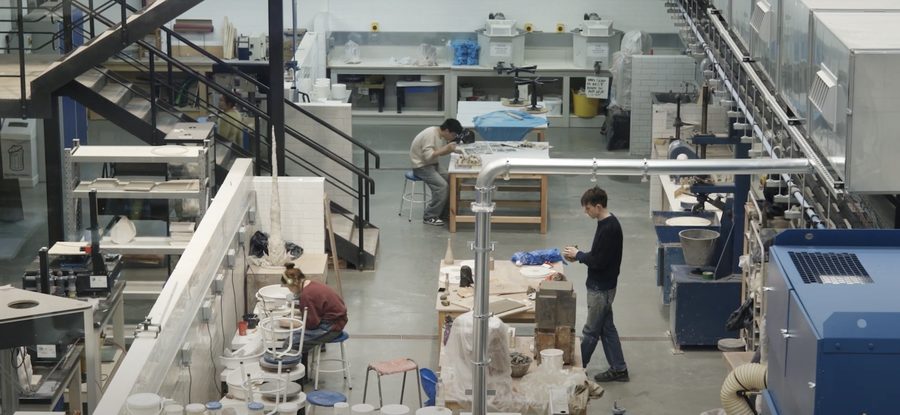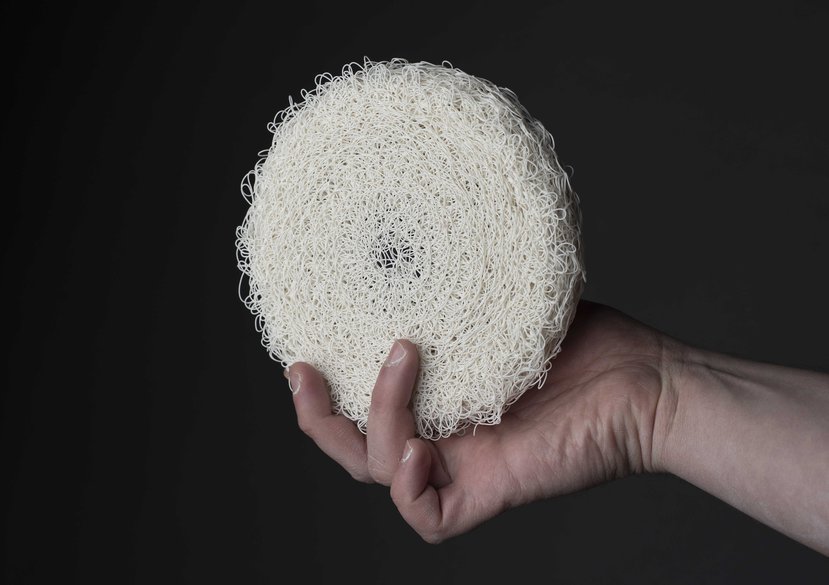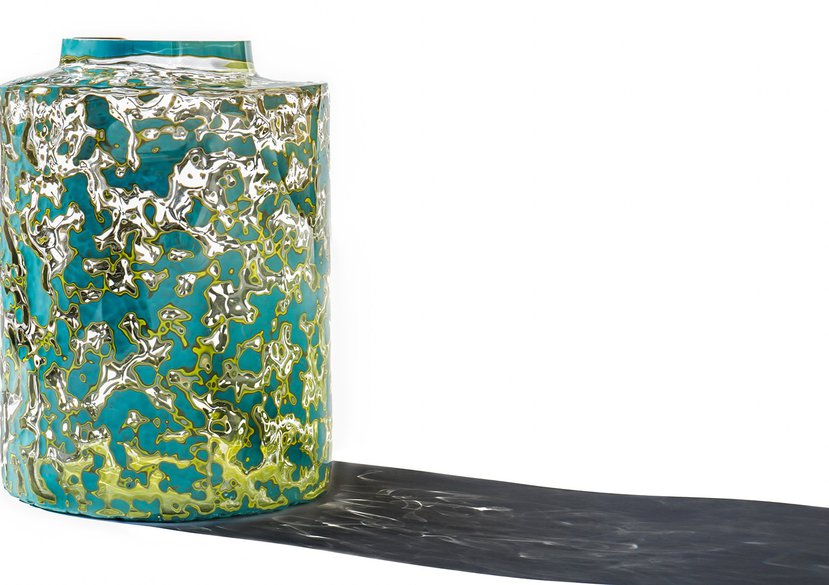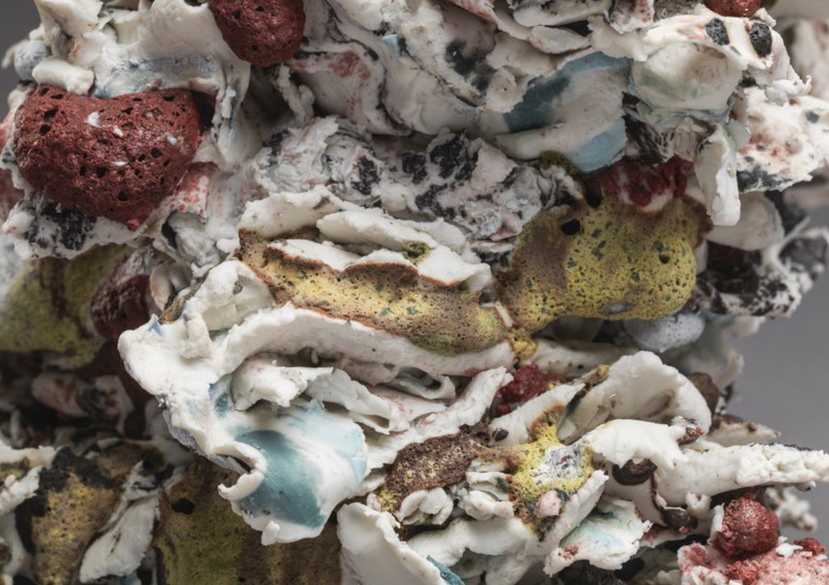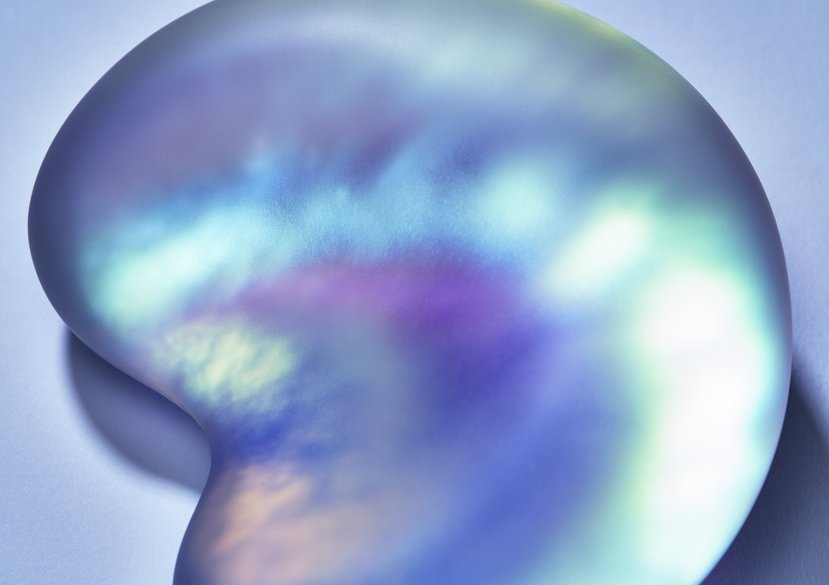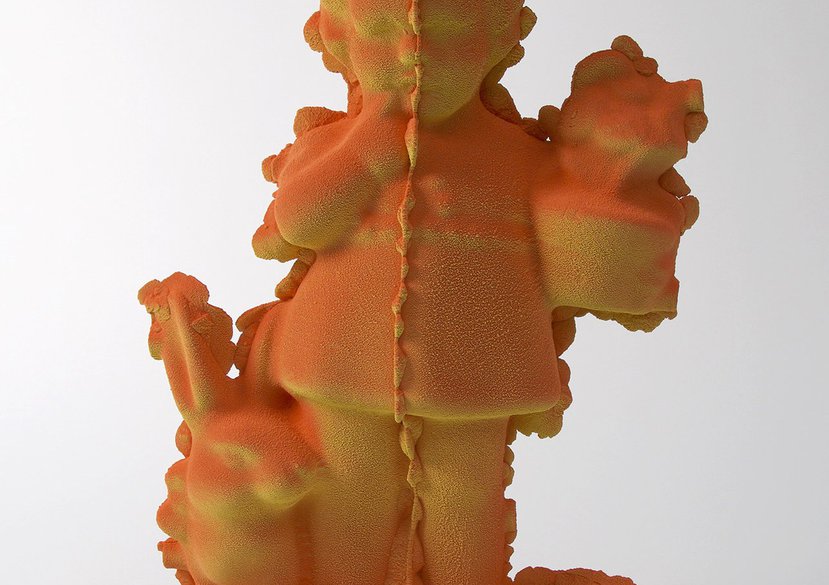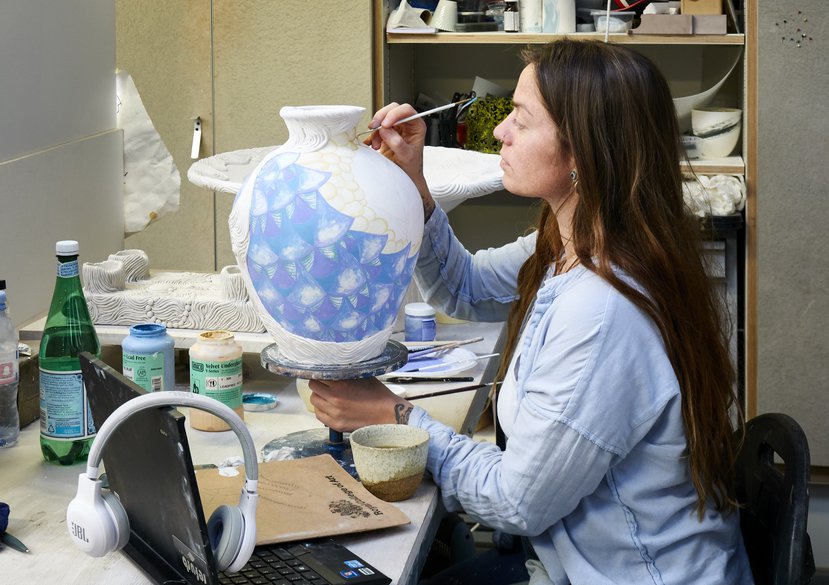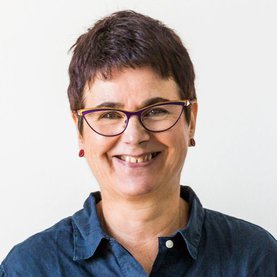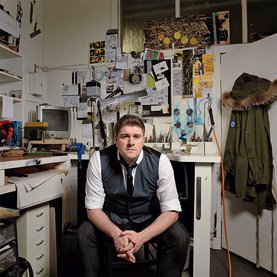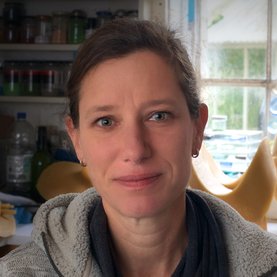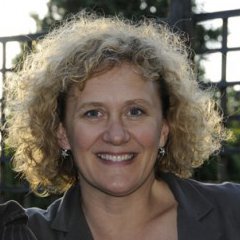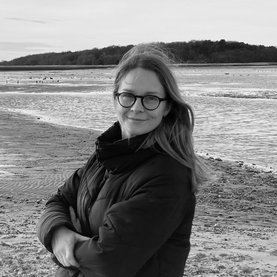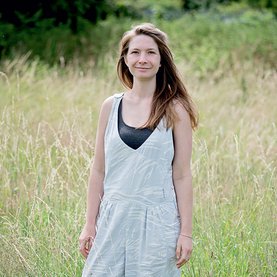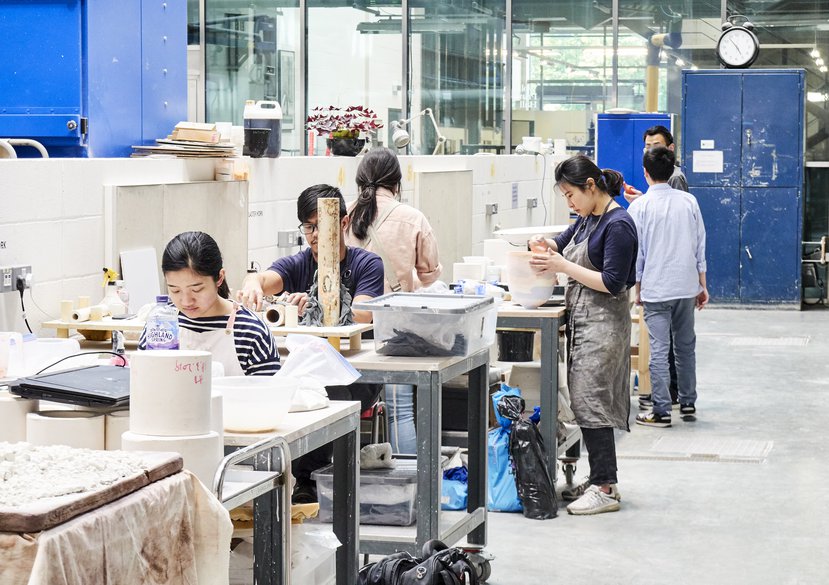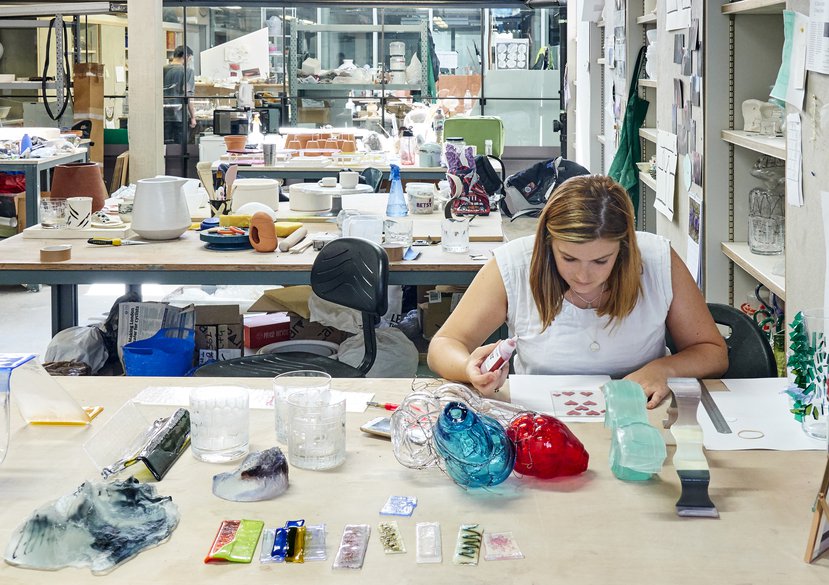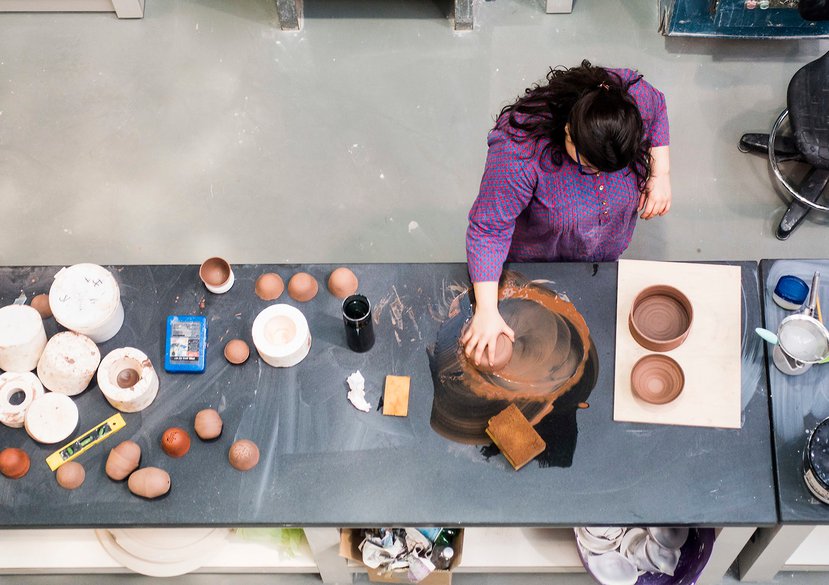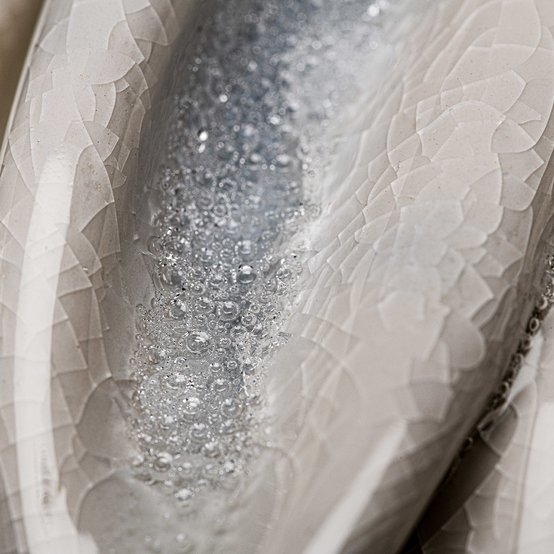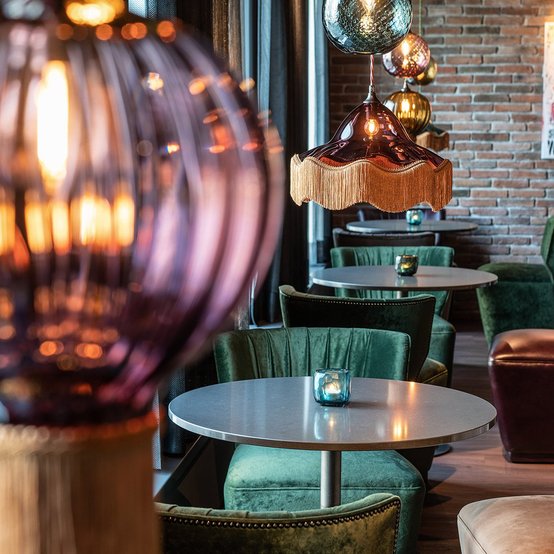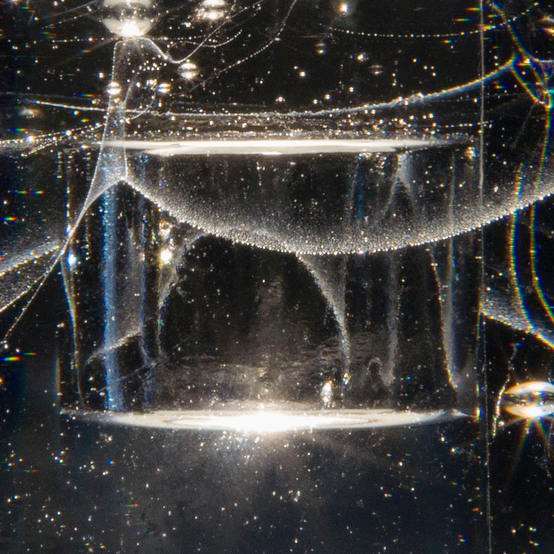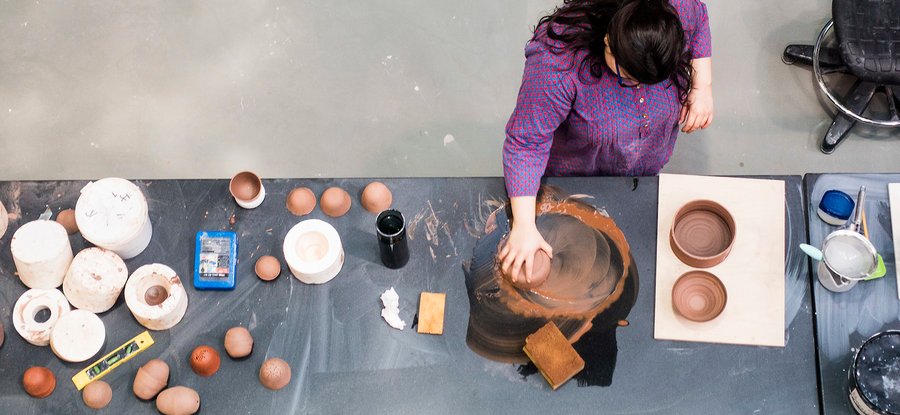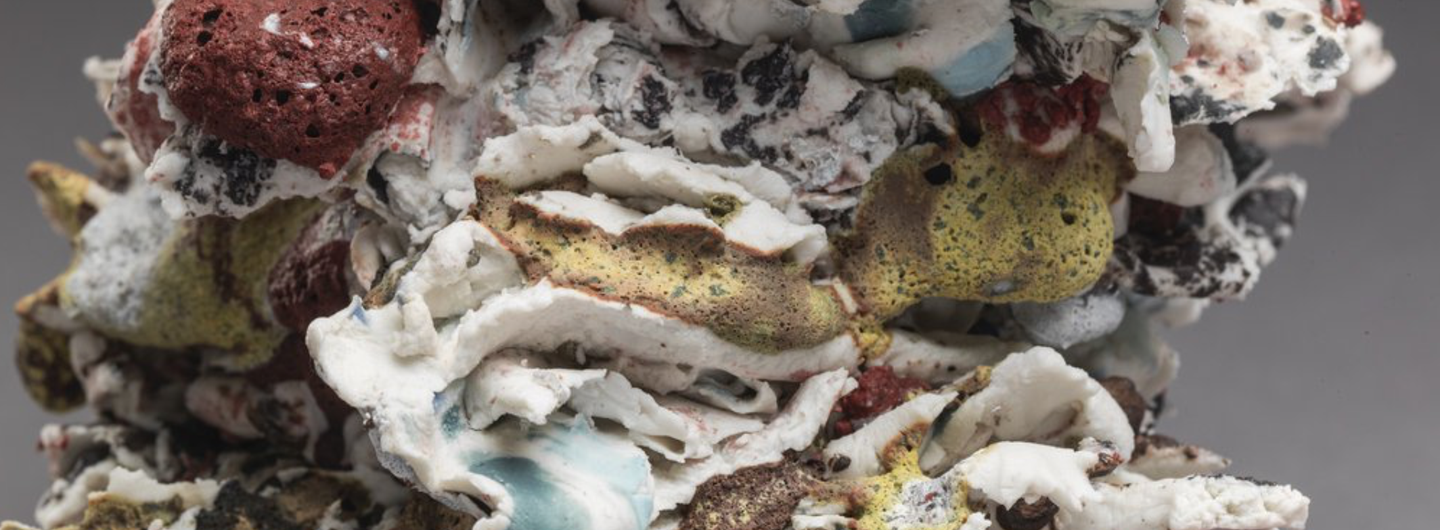
Overview
Thinking and making
Key details
- 180 credits
- 1 year programme
- Full-time study
School or Centre
Location
- Battersea
Next open event
Application deadline
- 14 Aug 2024
Explore the possibilities and perspectives of ceramics and glass.
We believe in the transformative power of material thinking, research and making. Be part of a new generation of artists and designers to enrich our world in imaginative and meaningful ways.
The Ceramics & Glass programme explores how we can manifest ideas through a tacit exploration of active materials and the generative potential of process. We’re interested in studio practice, the rich histories of object-making, and the new possibilities presented by technologies and global dialogues.
During your studies, we provide a creative environment where your personal concerns intersect with global perspectives. You’ll be encouraged to question, examine and respond to social, cultural and material challenges. Staff and students engage in diverse research topics resulting from the broad scope of ceramics and glass. This research, in turn, informs what is taught on the programme. Together, we’ll explore advances in technology and challenge traditional methodologies to create new and unique approaches.
Applications for the September 2024 intake are open and will be assessed on a rolling basis. Programmes will close for applications when the maximum number of places have been awarded, or at the final deadline on 14 August, 12 noon (UK time).
Explore graduate work
In July 2023, students presented RCA2023, a series of exhibitions and events. Explore online at the RCA2023 website.
You can also view previous events and exhibitions online at Showcase.
Find out more about this programme
Catch the replays from our latest online Open Day.
Gallery
Staff
Facilities
The School of Arts & Humanities is located across our Battersea and Kensington sites.
View all facilitiesAll full-time students on fine or applied arts programmes are provided with studios or workspace, and access to specialist workshops. There are a number of bookable seminar and project spaces across the site available to all Arts & Humanities students.
Our alumni
Our alumni form an international network of creative individuals who have shaped and continue to shape the world. Click on each name to find out more.
Where will the RCA take you?More details on what you'll study.
Find out what you'll cover in this programme.
What you'll cover
How you'll learn
The spectrum of enquiry is driven by live and studio projects. We’ll explore archives and collections to understand, question and reinterpret how the histories and traditions of our disciplines inform contemporary culture. Our relationship with site, communities and the built environment provides a framework for developing proposals. Specialist tutor-led group work focuses on areas such as metaphorical and phenomenological meaning within materiality. Finally, you’ll explore design-led ideas through object use, and the systems of production that they emerge from.
Drawing on our diverse network of contacts within the subject specialisms, lectures, artist talks and professional practice seminars from industry leaders are combined with field trips and practical skill sessions to support independent learning. Studio culture is nurtured within dedicated facilities that offer opportunities for collaborative and cross-disciplinary approaches – all aimed at developing the next generation of leading Ceramics & Glass graduates. Alongside programme-specific delivery, theory and contextual studies will be delivered across the Applied Art disciplines, situating and contextualising a material-led practice's thinking (and making) into the broader world.
There will be several opportunities to collaborate with others, but at a minimum, your programme will include 290 contact hours and 1,510 independent study hours. Contact hours can consist of lectures, seminars, tutorials, critical forums and workshops, among other types of teaching delivery.
Your programme's teaching types include briefings, projects, tutorials, seminars, lectures, critical forums, technical inductions, workshops, offsite visits and blended learning.
Programme structure
The programme is delivered across three terms and includes a combination of programme, School and College units.
Term 1
Term 1 begins with the Interrogating Your Practice and Deconstructing Assumptions (45 credits) unit, which focuses on developing tools for deconstructing and critiquing your own practice and previous methods/approaches and providing new contexts and directions for your work. Emphasis is placed on inviting new thoughts and progressive ideas through which to develop a ceramics and glass practice. During the unit you will be offered opportunities to explore techniques, collections, and environments alongside new modes of thinking to challenge and expand your perception of Ceramics & Glass practice.
Across Terms 1 and 2, you will participate in AcrossRCA, the College-wide unit. See below for more details.
Term 2
Over the course of the Developing Methodologies (30 credits) unit, you will explore themes situated within wider material culture, particularly those revealed by self-directed study via the lens of a Ceramics & Glass practice. Through experimentation and research, they will establish and develop the methodologies that will define your emerging practice. Developments and lines of enquiry formulated in Interrogating Your Practice and Deconstructing Assumptions, and through the Territory, will act as a background for producing a body of work. You will be required to write your proposal and develop the summative project for the Independent Research Project by the middle of this unit.
In Term 2 all School of Arts & Humanities students will participate in the Urgency of the Arts (15 credits), School-wide unit. Through this unit we ask: what does arts and humanities research and practice have to offer in our current socio-political climate? The unit introduces you to diverse perspectives, approaches, and practices relevant to contemporary practice and thought in the Arts & Humanities. The delivery is devised to help you identify and query your practices and disciplinary assumptions through encounters with others and within the various practices undertaken by students in the School and raise awareness around contemporary concerns. You will be supported in understanding the ramifications of your own work and practice within a broad cultural context, and to recognise its many potentially unintended readings and consequences.
Term 3
The Independent Research Project (60 credits) offers a point of synthesis through exhibition, critical reflection and portfolio production. The programme will support you in acquiring an advanced understanding of practice-led methodologies, critical reflection, production, and presentation. You will be supported in understanding practice-led methodologies, critical reflection, and presentation. The IRP supports you with the specific conceptual and material demands of exhibiting and sharing their work and uses this to prepare you for the diverse professional practices of contemporary art and design.
AcrossRCA
AcrossRCA is a compulsory 30-credit unit which is delivered as part of all MA programmes.
Situated at the core of your RCA experience, this ambitious interdisciplinary College-wide unit supports you in responding to the challenges of complex, uncertain and changing physical and digital worlds. Developed in response to student feedback, AcrossRCA creates an exciting opportunity for you to collaborate meaningfully across programmes.
Challenging you to use your imagination and intellect to respond to urgent contemporary themes, this ambitious unit will provide you with the opportunity to:
- make connections across disciplines
- think critically about your creative practice
- develop creative networks within and beyond the College
- generate innovative responses to complex problems
- reflect on how to propose ideas for positive change in local and/or global contexts
AcrossRCA launches with a series of presentations and panel discussions from acclaimed speakers who will introduce the themes and act as inspirational starting points for your collaborative team response.
Delivered online and in-person across two terms, the unit has been designed to complement your disciplinary studies and to provide you with a platform to thrive beyond graduation.
Requirements
What you need to know before you apply
Candidates are selected entirely on merit and applications are welcomed from all over the world. The selection process will consider creativity, imagination and innovation as demonstrated in your portfolio, as well as your potential to benefit from the programme and to achieve high MA standards overall.
You should have a good undergraduate degree in Ceramics or Glass or equivalent professional experience. Applications are welcomed from candidates from related backgrounds, for example, textiles, sculpture, architecture and industrial design. Work experience, either before or after a first degree, is a great advantage.
What's needed from you
Portfolio requirements
For your portfolio, you can submit up to five works or projects showing three images for each, totalling a maximum of 15 images. If you submit film, please limit this to three short works.
Each work could be a singular artwork/object or be representative of a more expansive project. The two additional images can be of other finished works in the series, close-ups, or work-in-progress. You do not have to submit the maximum of 15 images, the work does not necessarily need to be in ceramics or glass, and please do not submit images that have multiple images and further text on them.
We are looking at how you curate a refined, concise portfolio that best represents your practice to date. We hope to get an understanding of your individual creativity, your passion and curiosity for experimenting with materials and processes, your imagination and ideas and your ability to bring them into the world.
Video requirements
The making of this video offers you the opportunity to introduce yourself to us as a creative individual. You will need to carefully consider and plan what you would like to say in order to give us a clear and concise understanding of you and your work.
It might help for you to choose a specific object or project with which you can focus on how you tell us about your ideas, influences and experiences or you could decide to describe your creative journey to this point more broadly.
Some of the things we would like to hear from you are:
- Some details of the journey which has led you to want to study on the programme.
- What are the inspirations and influences behind your work?
- What methods, processes or approaches do you use?
- What are your ambitions in undertaking the course and what do you hope to learn and achieve?
- What context do you see your work residing in?
English-language requirements
If you are not a national of a majority English-speaking country you will need the equivalent of an IELTS Academic or UKVI score of 6.5 with a 6.0 in the Test of Written English (TWE) and at least 5.5 in other skills. Students achieving a grade of at least 6.0, with a grade of 5.5 in the Test of Written English, may be eligible to take the College’s English for Academic Purposes course to enable them to reach the required standard.
You are exempt from this requirement if you have received a 2.1 degree or above from a university in a majority English-speaking nation within the last two years.
If you need a Student Visa to study at the RCA, you will also need to meet the Home Office’s minimum requirements for entry clearance.
Fees & funding
For this programme
Fees for new students
Fees for September 2024 entry on this programme are outlined below. From 2021 onward, EU students are classified as Overseas for tuition fee purposes.
Home
Overseas and EU
Deposit
New entrants to the College will be required to pay a non-refundable deposit in order to secure their place. This will be offset against the tuition fees.
Home
Overseas and EU
Progression discount
For alumni and students who have completed an RCA Graduate Diploma and progress onto an RCA Master's programme – MA, MA/MSc, MFA, MDes, MArch, MEd or MRes – within 10 years, a progression discount of £1,000 is available.
* Total cost is based on the assumption that the programme is completed in the timeframe stated in the programme details. Additional study time may incur additional charges.
Scholarships
Scholarships
The RCA scholarship programme is growing, with hundreds of financial awards planned for the 2024/5 academic year. Examples of financial awards offered in 2023/24 are given below.
The Deputy Vice-Chancellor’s International Scholarship
For: All MA programmes, MArch, MFA, MDes, MRes & MEd
Eligibility criteria: Students from Australia, Bangladesh, Canada, Colombia, Cyprus, Egypt, France, Germany, Greece, Hong Kong, India, Indonesia, Ireland, Israel, Italy, Japan, Lebanon, Malaysia, Mexico, Nigeria, Pakistan, Poland, Portugal, Saudi Arabia, Singapore, South Korea, Spain, Sri Lanka, Switzerland, Taiwan, Thailand, Turkey, UAE, USA
Eligible fee status: Overseas fee status
Value: £7,000 towards fees
The Deputy Vice Chancellor’s EU Scholarship
For: All MA programmes, MArch, MFA, MDes, MRes & MEd
Eligibility criteria: Students from Austria, Belgium, Bulgaria, Croatia, Cyprus, Czech Republic, Denmark, Estonia, Finland, France, Germany, Greece, Hungary, Iceland, Italy, Latvia, Liechtenstein, Lithuania, Luxembourg, Malta, Netherlands, Norway, Poland, Portugal, Romania, Slovakia, Slovenia, Spain, Sweden, Switzerland, Turkey
Eligible fee status: Overseas fee status
Value: £7,000 towards fees
The Deputy Vice-Chancellor’s UK Scholarship
For: All MA programmes, MArch, MFA, MDes, MRes & MEd
Eligible fee status: Home fee status
Value: £5,000 towards fees
Charlotte Fraser Scholarship
For: Ceramics & Glass
Eligible fee status: Home fee status
Value: Full fees
Grocers' Bursary
For: MA Ceramics & Glass
Eligibility criteria: Home fee status
Value: £3,000 towards fees
Marit Rausing Scholarships in Ceramics & Glass
For: MA Ceramics & Glass
Eligibility criteria: Home fee status
Value: Full fees & maintenance
The RCA UK Disabled Students’ Scholarship
For: All MA programmes, MArch, MFA, MDes, MRes & MEd
Eligibility criteria: Students who identify as D/deaf or disabled
Eligible fee status: Home fee status
Value: £6,000 for living costs
Sir Frank Bowling Scholarships
For: All programmes excluding PhD & short courses
Eligibility criteria: Black or Black British Caribbean, Black or Black British African, Other Black Background, Mixed - White and Black Caribbean, Mixed - White and Black African
Eligible fee status: Home fee status
Value: Full fees & maintenance
The Vice-Chancellor’s UK Cost of Living Scholarship
For: All MA programmes, MArch, MFA, MDes, MRes & MEd
Eligible fee status: Home fee status
Value: £5,000 for living costs
Sir Alistair and Lady Pilkington Bursary
For: MA Ceramics & Glass
Eligible fee status: Home fee status
Value: £10,000 towards fees
House of Fraser Bursary
For: Any MA programme
Eligible fee status: Home fee status
Value: £10,000 towards fees
Radcliffe Trust Craft Scholarship
For: MA Painting, MA Sculpture, MA Jewellery & Metal, MA Ceramics & Glass
Eligible fee status: Home
Value: £9,000 Tuition Fee Discount
Applying for a scholarship
You must hold an offer to study on an RCA programme in order to make a scholarship application in Spring 2024. A selection of RCA merit scholarships will also be awarded with programme offers.
We strongly recommend that you apply for your programme as early as possible to stand the best chance of receiving a scholarship. You do not apply directly for individual awards; instead, you will be invited to apply once you have received an offer.
More information
Additional fees
In addition to your programme fees, please be aware that you may incur other additional costs associated with your study during your time at RCA. Additional costs can include purchases and services (without limitation): costs related to the purchase of books, paints, textiles, wood, metal, plastics and/or other materials in connection with your programme, services related to the use of printing and photocopying, lasercutting, 3D printing and CNC. Costs related to attending compulsory field trips, joining student and sport societies, and your Convocation (graduation) ceremony.
If you wish to find out more about what type of additional costs you may incur while studying on your programme, please contact the Head of your Programme to discuss or ask at an online or in person Open Day.
We provide the RCASHOP online, and at our Kensington and Battersea Campuses – this is open to students and staff of the Royal College of Art only to provide paid for materials to support your studies.
We also provide support to our students who require financial assistance whilst studying, including a dedicated Materials Fund.
External funding
There are many funding sources, with some students securing scholarships and others saving money from working. It is impossible to list all the potential funding sources; however, the following information could be useful.
Payments
Tuition fees are due on the first day of the academic year and students are sent an invoice prior to beginning their studies. Payments can be made in advance, on registration or in two instalments.
Start your application
Change your life and be here in 2024. Applications now open.
The Royal College of Art welcomes applicants from all over the world.
Before you begin
Make sure you've read and understood the entrance requirements and key dates
More information about eligibility and key datesCheck you have all the information you need to apply.
Read our application process guideConsider attending an Open Day, or one of our portfolio or application advice sessions
See upcoming sessionsPlease note, all applications must be submitted by 12 noon on the given deadline.
Ask a question
Get in touch if you’d like to find out more or have any questions.

